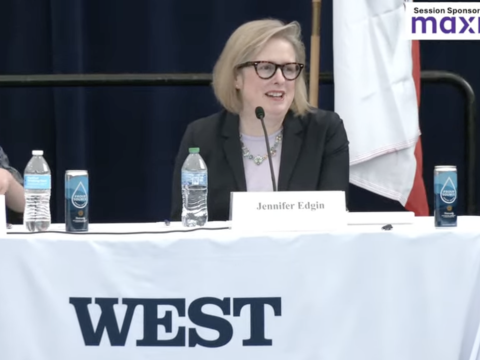Dual-Use Technologies: the Future of Intelligence
Dual-use technologies take center stage in the future of the intelligence community (IC).
“We're instead seeking to fundamentally change the way we do business, seeking to incorporate the private sector and academia,” said Avril Haines, director of national intelligence.
As the private sector increases investment toward cutting-edge technologies, Haines intends to capitalize these capabilities for the IC.
“Over the past 30 years, business R&D [research and development] has accelerated, while federal investment has largely plateaued,” Haines told the audience at an event in Bethesda, Maryland, on Tuesday.
Haines addressed the importance of transforming how the IC collaborates with the private sector and academic institutions. She called for deeper integration, understanding and collaboration.
Industries like artificial intelligence (AI), space and analytics wield geopolitical influence.
“We also recognize the importance from a national security standpoint of our financial sector, energy sector, telecommunication sector and aerospace sector, just to name a few,” Haines said.
Another way in which technology is affecting power competition is leveraging technologies that enable the free flow of information.
“The same digital technologies that were instrumental in facilitating civil society and freedom of the press in many places sparked a backlash from authoritarian regimes, first to contain the risks posed by freer flows of information and then to harness these same technologies in pursuit of their own objectives, to stifle freedom of expression and to suppress political discourse,” Haines explained.
Also, the IC must understand developments in key industries and work to protect intellectual property and critical infrastructure as well as election integrity.
We're instead seeking to fundamentally change the way we do business.
Workforce development and innovation were also relevant themes. Haines spoke about the need to attract and retain a diverse and skilled workforce. She touched on programs designed to enhance the IC’s ability to identify, develop and scale innovative technologies through collaborations with industry, including small business innovation research and other transaction authority contracting vehicles.
“We are working with industry on the development of an emerging technology curriculum that will familiarize the acquisition workforce with the unique business considerations of emerging technology companies and the full spectrum of available acquisition authorities to integrate and scale innovative technology,” Haines said.
Transparency and building trust with the public and stakeholders are also relevant, according to Haines. She discussed the need for the IC to be transparent about its operations, especially regarding the use of commercially available information and ensuring election security.
As a discussion on her legacy, after the change in administration in 2025, Haines emphasized the ongoing need to develop the IC’s workforce, institutional agility and reducing barriers that hinder the workforce’s ability to perform their duties.
Haines spoke at the Intelligence and National Security Summit, a yearly event organized by INSA, the Intelligence and National Security Alliance, and AFCEA, SIGNAL Media’s parent.




Comments